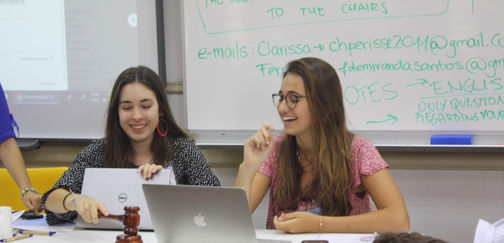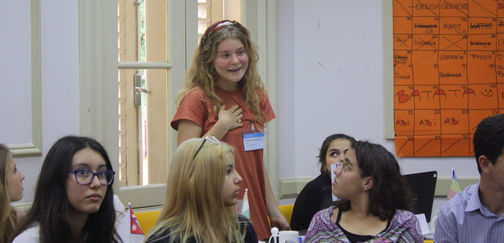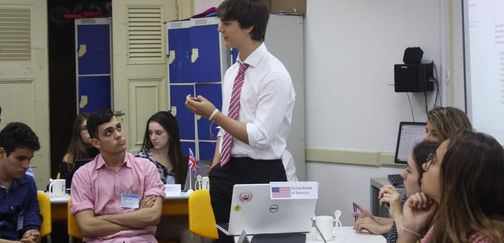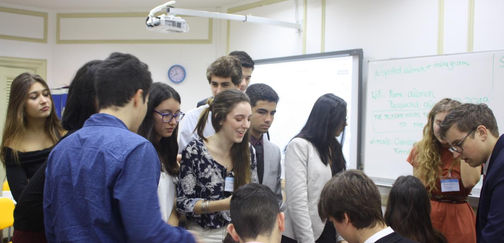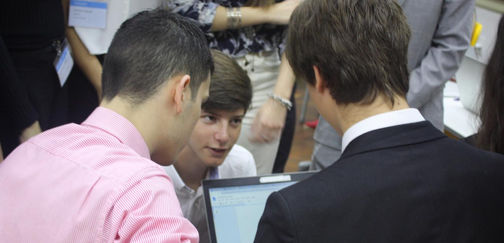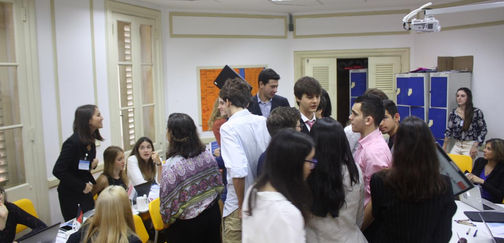Press Report
DAY 1
The first day of debate in the UNHRC from AleMUN 2019 proved that everyone present was engaged in the discussion. The issue of women's rights in South Asia, including the issue of forced marriage and abortion, was particularly disturbed by delegations.
In the statement by the council chairs, Clarissa Perissé and Fernanda Miranda, both expressed their satisfaction in the participation and involvement of the
delegations. They also expressed that they consider participants "strongly passionate" for the opportunity to discuss such a relevant topic for society. With that, they showed a sense of hope for the coming days of MUN.
They emphasized, however, that they see in the whole scenario a difficulty of homogenization by the delegations. Given that religion, beliefs and cultural differences play a fundamental and undeniable role in the debate on the issue of women. For this reason, at the very first opportunity they had the board, naturally, split into two blocks. One being from developing countries, most of which are governed by the Islamic or other religions, and the other group from more developed countries, such as the French Republic, Canada, and the Russian Federation. With the presence of two congregations, there was an objection to unanimity. Be it at the time of voting to choose a resolution or at the time of discussion.
Although the topic being discussed affects countries to varying degrees, directly or indirectly, and their dissimilarities, all strive to find a common solution for the good of the wider community.
Bearing in mind that there is a brutal economic difference between countries, we must then emphasize the different types of approach of each delegation.
In an interview with the delegation of Canada, represented by Beatriz Kacelnik, it was asked what role the Canadian committee plays in this debate. In his reply, it was explained how, although not essentially a country affected, the entire world fabric is eroded with permanent practices of violation of women's rights and that in this context its greatest power was through financial aid.
The same kind of idea was addressed in the speech of the delegation of the Russian Federation, which in turn, after many disconcerting with other delegations, decreed its financial aid. This is intended to assist other countries in the area of public health. Both the issue of disease prevention, which is often passed on to girls because they have sex with their husbands, who are often considerably older and the quality assurance of abortion procedures. In this way, the aim was to ensure the right of women to medicine that could help them.
The discussion is still boiling, and it is difficult to know how this situation will be dealt with, but, as the Canadian delegation said, "the mere fact that this topic is being discussed brings awareness of the subject, which is already a cause of hope for the world.".
-Mona Toni
______________________________________________________________________
DAY 2
On October 9, 2019, Wednesday, the activity of women trafficking activity between the horn of Africa to Nepal and India was exposed. The accusation was presented by Secretary-General of MUN, Isabela Bruxellas, to the Human Rights Council, which was assisted by UNHCR to resolve the crisis.
The present Yemen War affects not only those who live there but to some extent the entire world context. The death toll of civilians is shocking, but the horror experienced by citizens does not end there. Many Yemenis
migrate to Djibouti and Somalia in search of asylum. This migratory population is mostly made up of women and children. In this scenario, trafficking in women is a very present reality in South Asia.
In the crisis pointed out by SG, it was explained that the traffic routes between the horn of Africa and India and Nepal were discovered by US agencies.
The discovery of this illegal activity has become a matter of urgency for the councils that have come together to find a solution. Due to the high political tension in the region under discussion, finding a way to deal with different government is another cause for concern. During the debate, in the form of unmoderated caucus, delegations sought long and short term measures. They investigated possibilities of interfering directly in the places of operation, through the implementation of inspection groups.
Besides, the economic issue played a key role in this theme. NaFoye, Nations for Yemen, created in this edition of the MUN by UNHCR, which aims to assist the civil and economic situation in the Yemen War, was held responsible for providing financial aid for investigating the human trafficking complex. With this, they aim to understand the whole issue of human trafficking at the root of the problem.
Moreover, a lawsuit would be taken to secure a penalty for those responsible, the traffickers, but also the countries involved who were aware of the activities that were taking place.
The steps taken by the delegations caused a lot of turmoil in the resolution vote, as everyone wanted to resolve the situation as best as possible while defending the interests of their countries.
With all the setbacks the crisis was very well resolved and could guarantee a better life for thousands of women. The discussion of trafficking in people is still a long way to go, but it can already go a long way towards its eradication.
-Mona Toni





